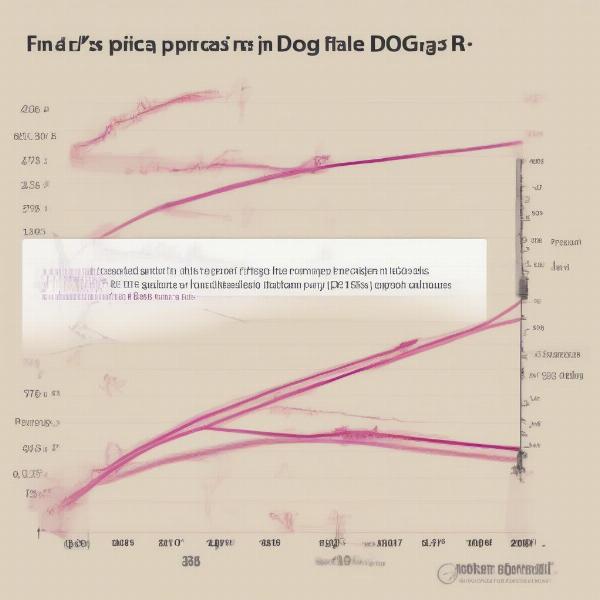Dog PRN, short for progesterone receptor number, plays a crucial role in canine reproductive health. Understanding this complex aspect of canine physiology is essential for breeders and owners alike, especially when dealing with breeding, pregnancy, or potential reproductive issues. This article will delve into the details of dog PRN, its importance, and how it influences various stages of a female dog’s reproductive life.
Understanding a dog’s progesterone receptor number is essential for responsible breeding and overall reproductive health. PRN directly influences a female dog’s ability to conceive, maintain pregnancy, and experience a healthy birth. While not a commonly discussed topic among pet owners, dog PRN is a crucial element for breeders and veterinarians.
What is Dog PRN and Why is it Important?
Progesterone receptors are special proteins found within cells that bind to the hormone progesterone. Progesterone, produced by the ovaries after ovulation, is essential for preparing the uterus for pregnancy, maintaining pregnancy, and regulating the estrous cycle. The number of these receptors, or PRN, determines how effectively the body responds to progesterone. A higher PRN generally suggests a better response to progesterone, potentially leading to increased fertility and a smoother pregnancy. Conversely, a lower PRN can indicate potential difficulties in conceiving or maintaining a pregnancy.
Factors Affecting Dog PRN
Several factors can influence a dog’s PRN. Breed, age, and individual genetic variations can all contribute to differences in PRN. Additionally, certain medical conditions and medications can also impact receptor numbers.
Breed Variations in PRN
Some breeds are known to have naturally higher or lower PRN compared to others. This can explain why certain breeds might have larger litter sizes or experience more reproductive challenges.
Age and PRN in Dogs
As dogs age, their PRN can fluctuate. Younger dogs typically have a higher PRN, which gradually decreases as they get older. This natural decline is part of the aging process and can contribute to decreased fertility in older females.
 Dog PRN – Age-Related Changes
Dog PRN – Age-Related Changes
How to Test Dog PRN
While understanding PRN is important, directly testing for it is not a routine procedure. Veterinarians can indirectly assess progesterone levels through blood tests, which can give some indication of potential PRN-related issues. However, these tests don’t directly measure receptor numbers. Further research and development are needed to create more accessible and accurate PRN testing methods.
The Role of PRN in Breeding and Pregnancy
For breeders, understanding the concept of PRN is particularly crucial. A higher PRN can indicate a greater likelihood of successful conception and a healthy pregnancy. While PRN is not the sole determinant of fertility, it is a significant factor to consider, especially when dealing with breeding dogs with a history of reproductive difficulties.
Managing PRN-Related Issues
If a dog is suspected of having PRN-related problems, a veterinarian can recommend various management strategies. These might include hormonal supplements or other supportive therapies to help improve the chances of a successful pregnancy.
Conclusion
Dog PRN, or progesterone receptor number, plays a crucial role in canine reproductive health. Understanding its significance can help breeders and owners make informed decisions about breeding and managing potential reproductive issues. While direct testing for PRN is not yet readily available, understanding the factors that influence it and consulting with a veterinarian are essential steps in ensuring the reproductive well-being of female dogs.
FAQ
-
What does PRN stand for in dogs? PRN stands for progesterone receptor number.
-
How is dog PRN tested? Direct testing is not readily available. Veterinarians assess progesterone levels through blood tests.
-
Why is PRN important for breeding? A higher PRN is associated with increased fertility and smoother pregnancies.
-
Does age affect PRN? Yes, PRN naturally declines with age.
-
Can PRN-related problems be managed? Yes, veterinarians can recommend hormonal supplements or other therapies.
Connect with ILM Dog for Expert Advice
ILM Dog is your trusted resource for all things dog-related. We offer expert advice on breed selection, health and medical care, training, nutrition, grooming, and much more. Our goal is to empower dog owners worldwide with the knowledge and resources they need to provide the best possible care for their canine companions. Whether you’re a seasoned dog owner or just starting your journey, ILM Dog is here to support you. Contact us at [email protected] or +44 20-3965-8624 for personalized guidance.